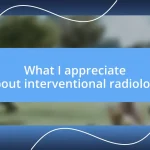Key takeaways:
- Health genomics enhances personal health management by predicting disease risk and informing tailored treatment and preventive measures.
- Choosing the right genomic tests involves careful research, consulting healthcare providers, and prioritizing credible companies for accurate interpretations.
- Future trends in health genomics point towards increased accessibility, integration of AI for data analysis, and a shift toward preventive personalized medicine.

Understanding health genomics
Health genomics dives deep into the interplay between our genes and our health, influencing everything from disease risk to treatment responses. I remember the first time I encountered a genetic test—it felt like peeking into a secret that my body had been keeping from me. Have you ever considered how much our DNA shapes our well-being?
Understanding health genomics is more than just analyzing DNA sequences; it’s about transforming how we approach healthcare. For instance, when I learned that certain genetic markers could predict my likelihood of developing specific conditions, it was empowering. Knowing this information sparked a journey toward preventive measures that I never would have considered without that insight.
Moreover, the science of health genomics is continuously evolving, creating new possibilities for personalized medicine. It’s fascinating to contemplate how tailored therapies can significantly improve treatment efficacy. How does knowing your genetic predispositions help you make informed decisions about your health? For me, it meant embracing a proactive attitude, reminding me that knowledge truly is power in maintaining wellness.

Personal health genomics benefits
Exploring personal health genomics has opened a world of possibilities for me, highlighting benefits that extend beyond just understanding genetic risks. Knowing my genetic makeup not only provided clarity on potential health challenges but also fueled my motivation to adopt healthier lifestyle choices. I discovered personalized insights that guided me toward tailored nutrition and exercise routines, enhancing my overall well-being.
Here are some key benefits that I’ve observed:
- Empowered Decision-Making: With genetic information, I feel more in control of my health decisions, allowing me to choose tests and treatments that align with my genetic profile.
- Preventive Health: The insights I’ve gained have pushed me to engage in proactive healthcare measures, emphasizing prevention rather than reaction.
- Tailored Treatment Plans: Genetic information has guided my healthcare providers to customize treatments that are more effective for me, increasing the chances of successful outcomes.
- Family Health Insights: Understanding my genetics helps me not only to prioritize my health but to educate my family about potential genetic issues we may face together.
Each of these benefits resonates with my personal journey, making health genomics not just a scientific endeavor but a deeply personal one.

Choosing the right tests
When it comes to choosing the right tests in health genomics, I’ve learned that a careful approach can make all the difference. Initially, I felt overwhelmed by the sheer number of options available. However, taking the time to research and understand what each test offers really helped me narrow down my choices. Have you experienced the challenge of deciding which test suits you best? In my case, focusing on tests that aligned with my health goals made the decision process significantly easier.
I always recommend considering the credibility of the testing company and the expertise behind their analysis. It’s vital to look for companies that provide clear interpretations of results. For example, I chose a test that not only highlighted genetic predispositions but also offered actionable insights tailored to my lifestyle. This clarity felt reassuring and empowered me to take real steps toward improving my health.
Lastly, I realized the importance of consulting my healthcare provider before making a final decision. Engaging in a dialogue with my doctor helped me assess which tests would provide the most relevant information for my unique situation. It reminded me that collaboration is key in this intricate world of genomics. After all, the right tests can lay the foundation for a tailored health journey that resonates with my personal experiences and aspirations.
| Factor | Considerations |
|---|---|
| Testing Purpose | What specific information are you seeking (e.g., disease risk, ancestry, treatment options)? |
| Credibility | Choose reputable companies that provide clear result interpretations. |
| Provider Consultation | Discuss options with a healthcare provider for tailored insights. |

Interpreting genomic data accurately
Interpreting genomic data accurately requires a keen eye for detail and an understanding of how genetics can influence health. I remember the first time I received my genetic report—it was a mix of excitement and anxiety. Were these numbers merely data points, or could they hold keys to my future? Diving deep into the results, I sought guidance from genetic counselors who helped decode the complex terminology, reinforcing the importance of expert aid in making sense of my genomic landscape.
One aspect that often gets overlooked is the context in which genomic data is interpreted. I learned early on that a variant’s significance can shift based on new research. It’s crucial to stay updated! For instance, I discovered that a particular genetic variant I carried was initially associated with a higher risk for a condition. However, as more studies emerged, its relevance diminished significantly. Keeping a pulse on the latest findings empowers me to reassess risk levels and adjust my health plan accordingly.
Lastly, I’ve found it incredibly valuable to consider my family history alongside genomic data. I often reach out to relatives to gather insights about their health journeys, weaving together an intricate tapestry of our shared genetics. Have you thought about how family context influences interpretation? My family’s health experiences not only provide a broader perspective but also underscore the notion that data is more than mere numbers; it’s a story about who I am and where I come from. Embracing this holistic view has been transformative for my understanding of my genomic data.

Making informed health decisions
Making informed health decisions hinges on the ability to critically analyze the data we receive from genomic tests. Reflecting on my experience, I remember sitting down with my results, feeling both empowered and apprehensive. How do I sift through the nuances of these findings to make decisions that truly matter? By breaking down each result and evaluating them against my personal health goals, I was able to transform overwhelming data into actionable insights.
Moreover, I found it crucial to adopt a proactive approach in seeking additional information. For instance, after one test indicated a predisposition to a certain condition, I dove headfirst into literature and discussions within online communities. This process not only educated me but also helped me to connect with others facing similar challenges. Have you ever felt alone in your health journey? Joining discussions reminded me that I was part of a larger dialogue, filling in the blanks around my health choices with shared experiences and collective wisdom.
Finally, synthesizing genomic information with lifestyle choices isn’t just about preventing health issues; it’s also about enhancing my overall wellbeing. When I adopted a healthier diet influenced by my genetic predispositions, I felt more energetic and connected to my body. This realization sparked an important question: how can we leverage our genetic insights not just for prevention but for thriving? I genuinely believe every decision we make—whether about diet, exercise, or routine check-ups—can be enriched by understanding our unique genetic makeup, making every choice more meaningful and impactful.

Integrating genomics into lifestyle
Integrating genomics into my lifestyle has been a game changer. One vivid memory that stands out is when I tailored my exercise routine after learning about my genetic response to different forms of physical activity. I was always drawn to endurance sports, but my genetic predispositions suggested I might actually thrive in strength training instead. Switching my focus not only made workouts more enjoyable, but I also noticed a significant boost in my overall fitness levels. Have you ever considered how a simple tweak in your routine could make all the difference?
As I began to incorporate genetics into my daily choices, nutrition became another area of focus. I vividly remember experimenting with a diet plan that aligned with my genetic markers for lactose sensitivity. Honestly, at first, giving up dairy felt daunting, almost like losing a comforting food tradition. Yet, embracing plant-based alternatives not only made me feel better physically but also emotionally lighter, as I nurtured my body more intentionally. I often wonder—how many others are guided by their taste buds rather than their genetic cues?
Reflecting on these experiences, the integration of genomics into lifestyle isn’t just about data-driven choices; it’s about creating a deeper relationship with my health. I find joy in cooking meals designed for my genetic makeup, turning the kitchen into a laboratory of wellness. Have you thought about what it might mean to actively personalize your health journey? When I savor a nutrient-packed dish, I’m not just feeding my body; I’m honoring my unique genetic blueprint, crafting a lifestyle that truly resonates with who I am.

Future trends in health genomics
As I look towards the future of health genomics, one trend that really excites me is the anticipated shift towards personalized medicine that goes beyond treatment into prevention. I can envision a time when genomic data will be integrated seamlessly into routine healthcare, allowing us to tailor interventions before diseases even develop. Wouldn’t it be incredible to have a proactive health plan that evolves with our genetic insights, rather than just reacting after a problem arises?
Additionally, the increasing accessibility of genomic testing stands out as a significant trend. For instance, when I first explored genetic testing, the process felt overwhelming and often out of reach for many. Now, with advancements in technology, we’re seeing lower costs and simplified tests that can be done from home—this democratizes access to crucial health information. Can you imagine how this shift will empower individuals to take charge of their health with newfound knowledge?
Lastly, I am particularly interested in the fusion of artificial intelligence with genomic data. Exploring my genetic makeup feels like peeling back layers of a fascinating puzzle, but AI has the potential to analyze vast amounts of data in minutes. This could lead to remarkable breakthroughs in understanding how our genes interact with the environment. Have you considered how AI might influence your health decisions in the coming years? It’s thrilling to think that the future could bring insights and innovations that revolutionize how we approach our wellbeing.














